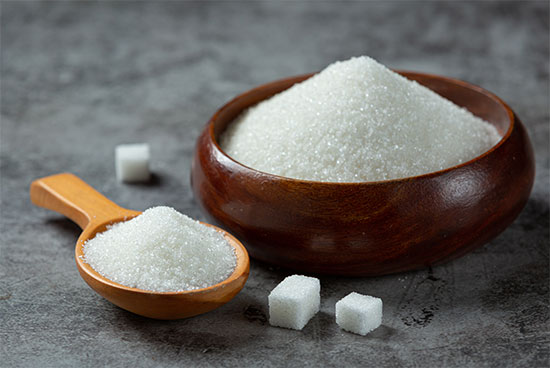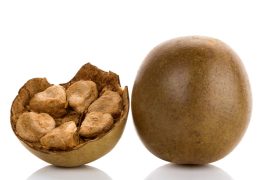Each and every food has its own nutritional facts and this should be followed religiously as far as our health is concerned. Each food has its own nutrition and it is tailored and made for the betterment of our health. A wise choice of nutrition-oriented food will certainly allow us to lead a healthy life.
1.) Curb Sugar Intake
 Sugar is a disaster and it should be taken at least in the least quantity or should be avoided completely. To improve the taste of processed foods, producers often add sugar to them. This type of sugar is known as added sugar. Common types of added sugar include table sugar or sucrose and syrups, such as high-fructose corn syrup. Sugar might have some nutrition facts but daily consumption or having too much is unhealthy. While some think sugar is a simple matter of “empty” calories, others believe it increases the risk of diseases that kill millions of people each year.
Sugar is a disaster and it should be taken at least in the least quantity or should be avoided completely. To improve the taste of processed foods, producers often add sugar to them. This type of sugar is known as added sugar. Common types of added sugar include table sugar or sucrose and syrups, such as high-fructose corn syrup. Sugar might have some nutrition facts but daily consumption or having too much is unhealthy. While some think sugar is a simple matter of “empty” calories, others believe it increases the risk of diseases that kill millions of people each year.
2.) Omega-3 Fats
 Having Omega-3 fats are crucial and has its own nutritional facts. Omega-3 fatty acids are extremely important for the proper functioning of the human body. However, it has been observed that docosahexaenoic acid (DHA), an omega-3 fatty acid derived from animals, makes up about 10–20% of the total fat content in the brain. On the other hand, a low intake of omega-3 is associated with a lower IQ, depression, various mental disorders, heart disease and many other serious diseases. For nutritional facts, there are three main types of omega-3 fats: alpha-linolenic acid (ALA), eicosapentaenoic acid (EPA) and docosahexaenoic acid (DHA).
Having Omega-3 fats are crucial and has its own nutritional facts. Omega-3 fatty acids are extremely important for the proper functioning of the human body. However, it has been observed that docosahexaenoic acid (DHA), an omega-3 fatty acid derived from animals, makes up about 10–20% of the total fat content in the brain. On the other hand, a low intake of omega-3 is associated with a lower IQ, depression, various mental disorders, heart disease and many other serious diseases. For nutritional facts, there are three main types of omega-3 fats: alpha-linolenic acid (ALA), eicosapentaenoic acid (EPA) and docosahexaenoic acid (DHA).
3.) Having a Perfect Diet
 The perfect diet varies from person to person. Each individual diet has its own nutritional facts and it hence depends upon the suitability of the person. Subtle differences in genetics, body type, physical activity and environment can affect which type of diet you should follow. Some people do prefer a low-carb diet, while others are better off on a vegetarian high-carb diet. The fact is simple, what works for one person may not work for the other. To figure out what one should do, a little experimentation as far as the taste and the nature of the diet is concerned.
The perfect diet varies from person to person. Each individual diet has its own nutritional facts and it hence depends upon the suitability of the person. Subtle differences in genetics, body type, physical activity and environment can affect which type of diet you should follow. Some people do prefer a low-carb diet, while others are better off on a vegetarian high-carb diet. The fact is simple, what works for one person may not work for the other. To figure out what one should do, a little experimentation as far as the taste and the nature of the diet is concerned.
4.) Going Vegetarian Will Improve Your Health
 Vegetables are good for you as it has many nutrition facts. Being vegan has many advantages since they are rich in vitamins, minerals, fibre, antioxidants and an endless variety of trace nutrients that science has just begun to uncover. According to studies, eating vegetables is associated with improved health and a lower risk of disease. Eating vegetables each day is really healthy and fulfils your daily nutrition need, thus offering a variety to your diet.
Vegetables are good for you as it has many nutrition facts. Being vegan has many advantages since they are rich in vitamins, minerals, fibre, antioxidants and an endless variety of trace nutrients that science has just begun to uncover. According to studies, eating vegetables is associated with improved health and a lower risk of disease. Eating vegetables each day is really healthy and fulfils your daily nutrition need, thus offering a variety to your diet.
5.) Avoid Supplements Rely on Real Foods
 Real food is always real and has many nutrition facts associated with it. Taking supplements is good, but solely depending upon them is not considered for the long run. Supplements can never fully replace real foods, as real foods have their own essence into it. For example, nuts aren’t just shells loaded with polyunsaturated fat. In the same way, fruits aren’t just watery bags of sugar. These are real foods with a massive variety of trace nutrients. The vitamins and minerals, the ones you can also get from a cheap multivitamin, are just a small part of the total amount of nutrients in foods. Therefore, supplements cannot match the variety of nutrients you get from real foods.
Real food is always real and has many nutrition facts associated with it. Taking supplements is good, but solely depending upon them is not considered for the long run. Supplements can never fully replace real foods, as real foods have their own essence into it. For example, nuts aren’t just shells loaded with polyunsaturated fat. In the same way, fruits aren’t just watery bags of sugar. These are real foods with a massive variety of trace nutrients. The vitamins and minerals, the ones you can also get from a cheap multivitamin, are just a small part of the total amount of nutrients in foods. Therefore, supplements cannot match the variety of nutrients you get from real foods.
6.) Unprocessed Food Healthiest of all
 Consumption of unprocessed food is treated as healthy as it contains all the necessary nutritional facts that everyone agrees. Processed food is generally not as healthy and should be avoided. As the food system has become more industrialized, the health of the population has deteriorated. During food processing, many of the beneficial nutrients in the food are removed. Not only do food producers remove healthy nutrients like fibre, but they also add other potentially harmful ingredients like added sugar and trans fats. Additionally, processed foods are loaded with all sorts of artificial chemicals, some of which have a questionable safety profile. However, processed foods have less of the good stuff and a lot more of the bad stuff.
Consumption of unprocessed food is treated as healthy as it contains all the necessary nutritional facts that everyone agrees. Processed food is generally not as healthy and should be avoided. As the food system has become more industrialized, the health of the population has deteriorated. During food processing, many of the beneficial nutrients in the food are removed. Not only do food producers remove healthy nutrients like fibre, but they also add other potentially harmful ingredients like added sugar and trans fats. Additionally, processed foods are loaded with all sorts of artificial chemicals, some of which have a questionable safety profile. However, processed foods have less of the good stuff and a lot more of the bad stuff.
7.) Drinking Water
 Drinking plenty of water has many nutrition facts and hence it is helpful to our overall body health. Not only should you be mindful of what you eat, but you should also pay close attention to how much water you drink each day. Besides all, drinking water in itself solely not offers several health benefits to the body, but also helps to keep the body running at optimum capacity. Plus, research shows that, by strategically drinking water, you can increase your weight loss by up to 44 per cent. And researchers have shown that drinking half a litre of water can boost your metabolism by 24 per cent to 30 per cent within one to half an hour.
Drinking plenty of water has many nutrition facts and hence it is helpful to our overall body health. Not only should you be mindful of what you eat, but you should also pay close attention to how much water you drink each day. Besides all, drinking water in itself solely not offers several health benefits to the body, but also helps to keep the body running at optimum capacity. Plus, research shows that, by strategically drinking water, you can increase your weight loss by up to 44 per cent. And researchers have shown that drinking half a litre of water can boost your metabolism by 24 per cent to 30 per cent within one to half an hour.
8.) Adding Vitamin D In Your Nutrition Regime
 Adding Vitamin D to your daily diet has many nutrition facts. Vitamin D is unique and cannot be synthesized in the body. Our body receives vitamin D when it’s exposed to UV rays from the sun. In many places around the world, the sun is not always available, and weather conditions can make spending time outside difficult. This is why so many people are deficient in vitamin D and may not even know it. Being unique it does not function like many other vitamins and minerals. It actually acts as a major steroid hormone in the body, and a deficiency in it could lead to various diseases, such as osteoporosis, diabetes and cancer.
Adding Vitamin D to your daily diet has many nutrition facts. Vitamin D is unique and cannot be synthesized in the body. Our body receives vitamin D when it’s exposed to UV rays from the sun. In many places around the world, the sun is not always available, and weather conditions can make spending time outside difficult. This is why so many people are deficient in vitamin D and may not even know it. Being unique it does not function like many other vitamins and minerals. It actually acts as a major steroid hormone in the body, and a deficiency in it could lead to various diseases, such as osteoporosis, diabetes and cancer.
9.) Inducing Carbohydrates in your diet
 Carbohydrates do possess nutrition facts which are widely necessary for our body. It is to be noted that carbohydrates are in fact our body’s main energy source, and our body very much needs them to make glucose, which actually provides us with the energy to go about our daily activities. Moreover, most of the calories that are needed by the body should come from carbohydrates themselves.
Carbohydrates do possess nutrition facts which are widely necessary for our body. It is to be noted that carbohydrates are in fact our body’s main energy source, and our body very much needs them to make glucose, which actually provides us with the energy to go about our daily activities. Moreover, most of the calories that are needed by the body should come from carbohydrates themselves.
10.) Intake of Green Tea
 Consumption of green tea is treated as a healthy beverage and has many nutrition facts. Green tea is rich in powerful antioxidants, including a bioactive compound called EGCG. Studies confirm that the people who drink the greenest tea have a lower risk of serious diseases like heart disease and cancer. There is also evidence that the bioactive compounds in green tea can boost metabolism and increase fat burning. Green tea also contains certain amino acids that may help improve concentration and brain function.
Consumption of green tea is treated as a healthy beverage and has many nutrition facts. Green tea is rich in powerful antioxidants, including a bioactive compound called EGCG. Studies confirm that the people who drink the greenest tea have a lower risk of serious diseases like heart disease and cancer. There is also evidence that the bioactive compounds in green tea can boost metabolism and increase fat burning. Green tea also contains certain amino acids that may help improve concentration and brain function.
Disclaimer:
The information contained in this article is for educational and informational purposes only and is not intended as a health advice. We would ask you to consult a qualified professional or medical expert to gain additional knowledge before you choose to consume any product or perform any exercise.








